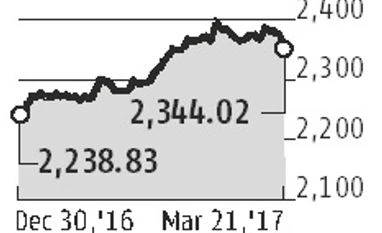That trade went into reverse in Tuesday’s U.S. trading: The S&P 500 fell 1.2%, its first decline of more than 1% this year and biggest drop since October, while the ICE U.S. dollar index, which tracks the dollar against a basket of six currencies, slipped below 100 for the first time since Feb. 6.
But even before the reversal there had been weeks of stall. In fact, a more successful strategy this year than the Trump trade has been to discount a U.S. recovery and bet instead on Europe and Asia, particularly China. The MSCI Emerging Markets Index is up 8.6% in 2017—driven by double-digit gains in Turkey, China, Hong Kong and India—trumping the S&P 500’s 4.7%. Even European stocks have outperformed the U.S. over the past month, despite concerns around France’s coming election.
The skittishness spilled into Asia Wednesday. Japan’s Nikkei 225 Stock Average fell 2.1% to 19183.27, erasing all its gains for the year. The yen strengthened to as much as ¥111.4350 to the dollar; a strong yen typically hurts the earnings of Japanese exporters. Shares also struggled in Hong Kong, with Chinese companies particularly hard hit.
Increasingly, investors are showing they believe the Trump trade has got out of hand. Around one-third of portfolio managers believe global equities are overvalued, the highest level on record going back to the turn of the century, according to Bank of America Merrill Lynch’s monthly survey of 200 funds managing $592 billion, and around four-fifths believe U.S. stocks are the most overvalued of all. Around a third believe the U.S. dollar is overvalued, the highest level since June 2006.
The “Trump Lite” trade hinges upon the administration’s getting sandbagged in policy fights, such as the current wrangling over health care. Drawn-out congressional debates over the details of stimulus measures could cause inflation to peter out, encouraging investors to resume the hunt for yield—buying bonds and stocks with sustainable dividend income.
From the start the market had been too optimistic about Donald Trump’s ability to execute the finer details of his economic policy, said Megan E. Greene, chief economist at Manulife Asset Management.
“The risks were always going to become more balanced in the markets as it became apparent how aggressive and difficult the administration’s policy agenda is this year, with limited legislative days remaining in the calendar,” she said. “There is little doubt some stimulus will come through, but it is likely to be smaller and take longer to hit the real economy than many investors would like to believe.”
But if Mr. Trump’s current woes are bolstering emerging markets, he still has wide scope to spoil the party, particularly by pushing on his campaign pledges to get tough on the U.S.’s trade partners.
“The market seems to have forgotten about the rhetoric Trump has talked about regarding trade,” said Fidelity’s Ms. Yeung.
To read the full story, Subscribe Now at just Rs 249 a month
Already a subscriber? Log in
Subscribe To BS Premium
₹249
Renews automatically
₹1699₹1999
Opt for auto renewal and save Rs. 300 Renews automatically
₹1999
What you get on BS Premium?
-
Unlock 30+ premium stories daily hand-picked by our editors, across devices on browser and app.
-
Pick your 5 favourite companies, get a daily email with all news updates on them.
Full access to our intuitive epaper - clip, save, share articles from any device; newspaper archives from 2006.
Preferential invites to Business Standard events.
Curated newsletters on markets, personal finance, policy & politics, start-ups, technology, and more.
Need More Information - write to us at assist@bsmail.in
)